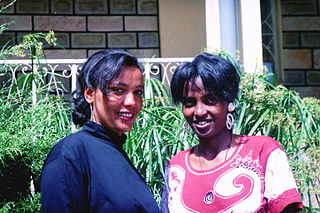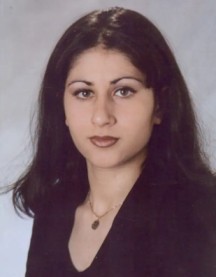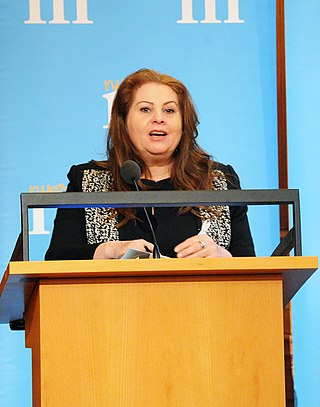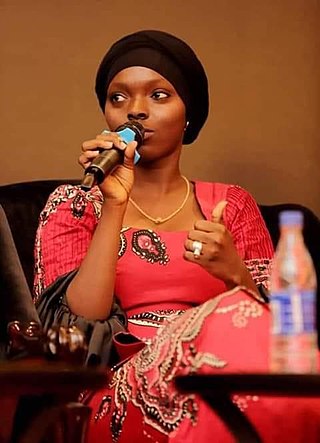Equality Now is a non-governmental organization founded in 1992 to advocate for the protection and promotion of the human rights of women and girls. Equality Now works through public policy channels to create a just world for women and girls. Through a combination of regional partnerships, community mobilization and legal advocacy the organization works to encourage governments to adopt, improve and enforce laws that protect and promote women and girls' rights around the world.
Kurdish women have traditionally played important roles in Kurdish society and politics. In general, Kurdish women's rights and equality have improved dramatically in the 21st century due to progressive movements within Kurdish society. However, despite the progress, Kurdish and international women's rights organizations still report problems related to gender inequality, forced marriages, honor killings, and in Iraqi Kurdistan, female genital mutilation (FGM).

Nyamko Ana Sabuni is a Swedish politician who was Leader of the Liberals between June 2019 and April 2022. She previously served as Minister for Integration from 2006 to 2010 and as Minister for Gender Equality from 2006 to 2013 in the Swedish government. A member of the Liberal Party, Sabuni was elected a Member of Parliament in 2002. Sabuni made history in June 2019, by becoming the first party leader in the Swedish parliament coming from an ethnic minority and the first party leader of a refugee background. In April 2022, Sabuni resigned as party leader.

Fadime Şahindal was a Kurdish immigrant who moved to Sweden from Turkey at the age of seven. She was murdered by her father, Rahmi, in January 2002 in an honour killing.
International Day of Zero Tolerance for Female Genital Mutilation is a United Nations-sponsored annual awareness day that takes place on February 6 as part of the UN's efforts to eradicate female genital mutilation. It was first introduced in 2003.

There have been several studies concerning women in Ethiopia. Historically, elite and powerful women in Ethiopia have been visible as administrators and warriors. This never translated into any benefit to improve the rights of women, but it had meant that women could inherit and own property and act as advisors on important communal and tribal matters. As late as the first part of the 20th century, Queen Menen, consort of Emperor Haile Selassie I, had a decisive role in running the Ethiopian Empire. Workit and Mestayit regents to their minor sons have been held responsible for their provinces. They owed their rights to landed property because of a special type of land tenure that expected tenants to serve as militia to overlords, irrespective of gender. In 1896, Empress Tayetu Betul, wife of Emperor Menelik II, actively advised the government and participated in defending the country from Italian invasion. Prominent and other landowning women fought against the second invasion in 1935–41. With the assistance of European advisors, women in the ensuing period were kept out of the army and politics, even as advisors. Instead, they were restricted to family and household work of raising children and cooking. With a steady increase in female representation in education, they have started to undertake nursing, teaching, and other similarly supportive roles. Over the 2018–2019 period, their gradual participation in state politics has been increasing at a steady pace.

Kurds in Sweden may refer to people born in or residing in the Sweden of Kurdish origin.
The status of women in Iraq at the beginning of the 21st century is affected by many factors: wars, sectarian religious debates concerning Islamic law and Iraq's Constitution, cultural traditions, and modern secularism. Hundreds of thousands of Iraqi women are widowed as a result of a series of wars and internal conflicts. Women's rights organizations struggle against harassment and intimidation, while they work to promote improvements to women's status in the law, in education, the workplace, and many other spheres of Iraqi life, and to curtail abusive practices such as honor killings and forced marriages.

Comfort Iyabo Amah Momoh, is a British midwife who specializes in the treatment of female genital mutilation (FGM). Born in Nigeria, Momoh is a member of the British FGM national clinical group, established in 2007 to train health professionals in how to deal with the practice. Until 2017 she served as a public-health specialist at Guy's and St Thomas' NHS Foundation Trust in London. She is the editor of Female Genital Mutilation (2005).

Kakenya Ntaiya is a Kenyan educator, feminist and social activist.
Nigeria has the highest rate of female genital mutilation (FGM) in the world in total numbers. It is usually experienced by girls aged 0 to 15 years old. It involves either partial or complete removal of the vulva or other injury to the female genital organs and has no medical benefit.

Pela Atroshi was a 19-year-old Kurd from Farsta, Sweden. She was murdered in an honor killing by family members after being taken from Sweden to Duhok in Kurdistan. She was deemed to have brought shame on the family by moving out of the family home and trying to achieve some independence.

Diana Nammi is a Kurdish and British activist. She received a Barclays Woman of the Year Award in 2014. She was also named one of the BBC 100 Women in 2014.
Khadija Gbla is an Australian feminist and human rights activist She works as a cultural consultant, a keynote speaker and an anti- female genital mutilation (FGM) campaigner, based in South Australia. She founded the advocacy organisation No FGM Australia, which works to stamp out the practice.

Naana Otoo-Oyortey is a Ghanaian social activist, the executive director of the Foundation for Women's Health, Research and Development.

Juno Maria Petra Blom is a Swedish civil servant and former politician who has served as Ombudsman for Children in Sweden since 1 March 2024.
Rugiatu Turay is a Sierra Leonean women's rights activist. who is a staunch campaigner against female genital mutilation. She is the founder of The Amazonian Initiative Movement, a nonprofit organization with the main objective of eliminating the cultural practice of female genital mutilation in West Africa.

Hadja Idrissa Bah, also Hadja Idy is a child's rights and women's rights activist from Guinea, who was elected President of the Guinean Children's Parliament in 2016. She has advised President Emmanuel Macron on women's issues.
Honor-related violence in Sweden first received public attention in Sweden due to the honor killings of Sara Abed Ali in 1996, Pela Atroshi in 1999 and Fadime Sahindal in 2002. Honor related violence includes forced marriage, female genital mutilation, and other forms of coercion. According to the Swedish Agency for Youth and Civil Society in 2009, about 70 thousand women and men reported pressure to marry against their will. In 2019, the Swedish Police Authority started to specifically track honor-related crimes, and by November 2021, 4500 suspected honor-related crimes had been reported.
Rayehe Mozafarian is an Iranian women and children rights activist, author, and documentary filmmaker. The founder of Stop FGM Iran group and Woman and Zoorkhaneh campaign, she is best known for her researches and raising awareness about female genital mutilation in Iran and challenging the country's Zoorkhaneh Sports Federation to unban women from participating Iranian's ancient sport pahlevani and zoorkhaneh rituals.











